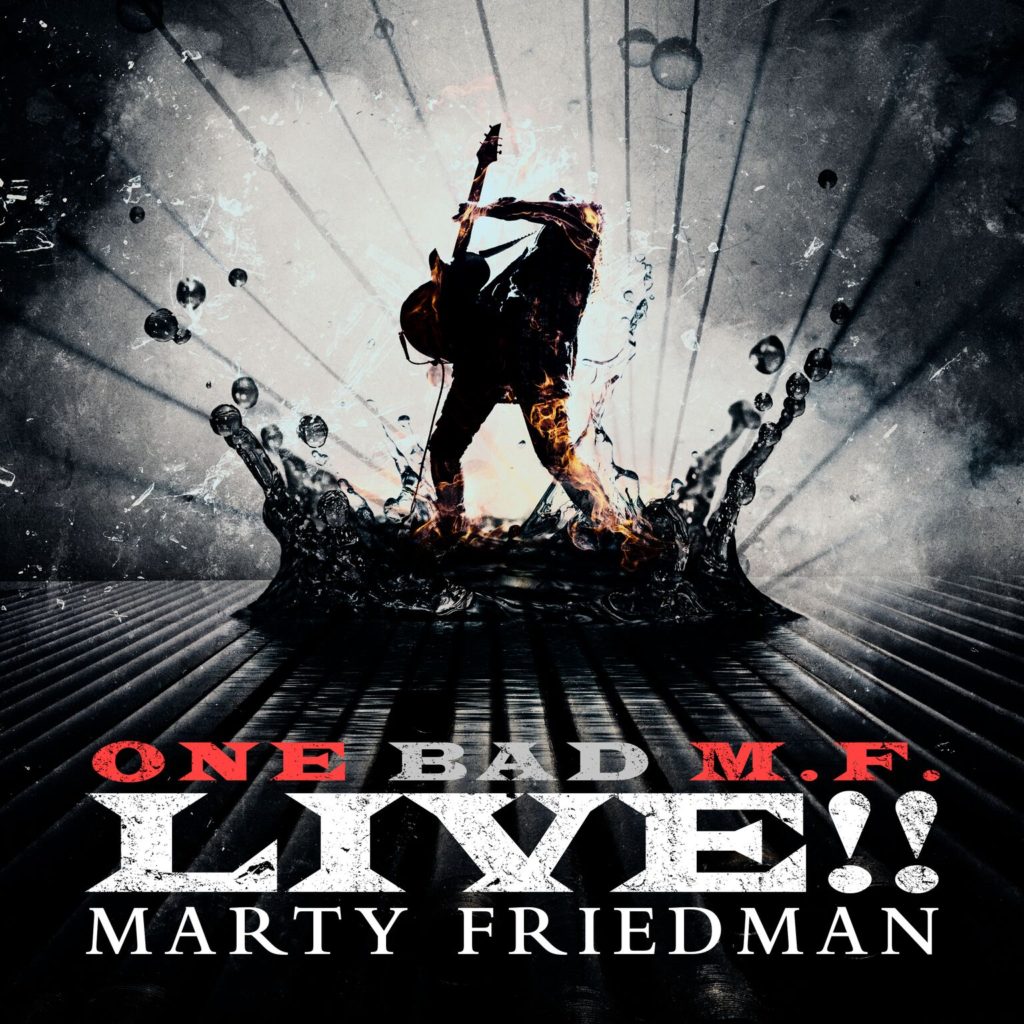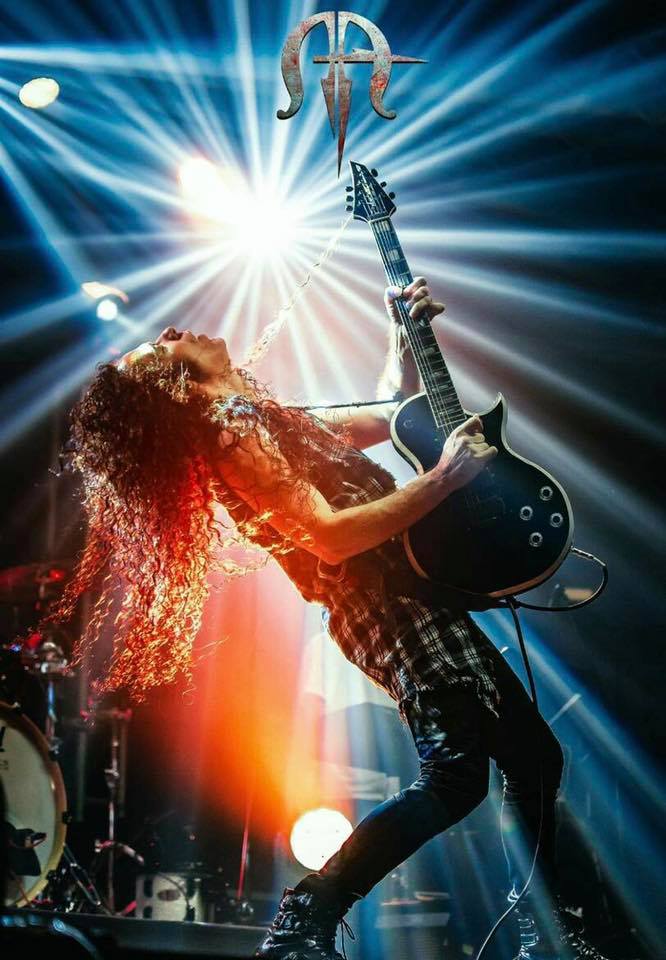Thunder From The East: A Conversation With Guitarist Marty Friedman
Say the name Marty Friedman in certain heavy metal circles here in the States and the reaction will be that of sheer adoration.
To some, Friedman is nothing short of a six-string hero who played an integral role in helped ratchet guitar playing up a notch in the mid-1980s along with fellow fretburners and Shrapnel Records label mates Jason Becker, Tony McAlpine, and Paul Gilbert to name a few. A 10-year tenure as lead guitarist for thrash titans Megadeth only served to solidify his Guitar God status.
In 2003, Friedman moved his ever-burgeoning musical talents to Japan, where he took up residency to explore the country’s unlimited musical boundaries. As popular as he was Stateside, it was nothing compared to what was to happen next.
Friedman became the star of a TV comedy, “Hebimeta-san” (“Mr. Heavy Metal”), and its spinoff, “Rock Fujiyama,” which ran for six seasons and led to appearances on more than 700 TV shows; parts in major Japanese motion films; and several TV commercials, including a two-year Coca-Cola campaign for Fanta. His popularity with the Japanese public led him to write two best-selling books in Japanese, and in 2017, the Japanese Government appointed Friedman as an Ambassador of Japan Heritage for a term of three years through the 2020 Tokyo Olympics along with J-pop icon Kyary Pamyu Pamyu, baseball legend Hideki Matsui and four others. He is the first foreigner ever to receive the title. Friedman also performed the Opening Ceremony at the Tokyo Marathon in both 2017 and 2018, and his most recent collaboration with the Tokyo Philharmonic Orchestra is the government-sponsored Japan Heritage Theme Song.
In other words, he’s a big deal there. A really big deal, which makes his return to the States all that more special.
Friedman is back for a few weeks this winter in support of his new album, “One Bad M.F. Live!!”, a scorching live platter released in October 2018 on Prosthetic Records. The tour includes a stop at Gabes in Iowa City this Friday night, Feb. 8, with special guests, Texas-based thrashers Immortal Guardian. Iowa’s own Tranzig (Des Moines) and Virtus (Cedar Rapids) will open. Showtime is 7 p.m.
Friedman took time to speak to ListenIowa about the tour, his “band-first” approach toward live performances, and his love of the Japanese music culture.
When you bounce back and forth from your home in Tokyo, Japan to playing dates in the U.S., is there much of a culture shock anymore, or at the two more similar than different?
Oddly, I get more culture shock going back to the States. I’ve lived in Japan for so long, and things change in the States so fast that if you don’t keep up with the latest news, you don’t know who is who, people are talking about things you don’t know, and there are new words and new concepts. It feels strange feeling like a foreigner in your own country, but it’s kind of exciting, too.
Do you make it a point to try to stay on top of things so that when you do come back to the U.S. to perform you have somewhat of an awareness of what’s going on?
Absolutely not. (laughs) There’s only so much data that can find its way to my small brain. There’s just too much to keep track of. I’m usually so deep in whatever music I’m working on that I’m kind of in a “bubble.”
What was it that drew your attention to Japan when you decided to move there permanently in 2003?
It was definitely the Japanese music environment. Every time I would come to Japan to tour I would hear the music that was being played, and it would always be Japanese music — not European or American — and I really liked it. I thought it was adventurous and modern. I felt like I could contribute more in the Japanese music scene than I could in America, which was heading more toward rap and country. Japanese music has more weird combinations and adventurous things. There are more risk takers.
Was the music here in the States, and maybe even your playing, getting stagnant, and you just needed something else?
I could see that I could just grow more in Japan. In America, the genres are very well defined. If you’re playing metal, you’re playing metal. If you’re playing pop, you’re playing pop. Dance is dance. Very rarely do they collaborate. Here in Japan, those rules are totally off the table, and anything can mix with anything.
Your latest album, “Live Bad M.F. Live!!”, is a live recording that came out last October. With such an extensive and varied library of songs to pick from, how did you go about selecting the songs that eventually became part of the album?
Luckily, it was kind of easy because I had done a live album in 2007. Our set is about two hours long, and I wanted to make the album about 75 minutes. I had to cut out a lot of stuff, so I cut out the stuff that was on the previous live album, leaving this one to be based on new music, some deep cuts, and older tracks, which was nice.
You get out of the gates fast on the album with “Speed Demon,” but the thing that’s noticeable early on is the fact that the song allows your band to shine as well.
Thanks for noticing that, because that’s a big part of the live show. This is a band. It’s not a guitar player who wants to be in the spotlight the whole time. I have no problem saying that my band members outshine me every single night, and that’s the way I want it and want it represented on the live album. It makes a more fun, well-balanced show when you have everybody involved. Each person in my band has such a unique character that really shines out. Even if you don’t see us live and just hear the record, you can definitely feel their presence. They’re not just there to back me up, they are there to be their own corner of the diamond, so to speak, and that’s what I’m most proud of. People may come to see me because they’ve probably known me for awhile, but they leave talking about my band members, and that’s the way I want it to be.
“Devil Take Tomorrow” is a slower, bluesy, melodic track that gives the album a nice change of pace. It’s a nice breather from the technical, fast material.
The big thing for me is contrast and timing. When you have a well-placed ballad in between some furious up-tempo songs, you can really drag the audience along with you and keep them interested. The timing of putting a kind of romantic love song in between some really thrashed out songs is a big part of my live show; it lets people’s ears rest a little, and they need that rest for when we take it back up later.
“Mutation Medley” closes out with “Tornado of Souls,” a track you recorded with Megadeth.
As much as I’m not a nostalgic type who wants to rest on my laurels or go back and be an oldies band, there are still a lot of people who have followed me around for a long time. That song is something that always comes up from the fans, and has really resonated with them, so I play it because I know I’m going to make them really happy by doing so. It’s a fun moment in the show, and I think people are surprised because some of them get the wrong impression that I’m not proud of what I’ve done in the past. That couldn’t be farther from the truth. I’m absolutely proud of everything I’ve done.
“Dragon’s Mistress” has that familiar Eastern-sounding melody that almost has a hypnotizing effect. It’s such a simple but great pattern.
It’s wonderful that you listen to it that close. I appreciate it. Believe it or not, I was trying to do one “poppy” song for that record. At that time, a lot of the hair metal or glam rock bands would have nine or 10 pop-rock songs and then have one or two kind of “heavy metal” songs where there’d be double bass, a pretty cool guitar riff, and have some kind of heavy metal title. All the other songs would be about chicks, but then there’d be one song called “Axe Attack.” (laughs) On the “Dragon’s Kiss” album (1988), I kind of did the opposite of that. It was all brutal, brutal metal music, but I wanted to have one song just in case there was a radio programmer out there who might want to play a mainstream song. (laughs) It was my kind of lame attempt at being mainstream. It’s kind of funny that that’s one of the songs that people have picked up on several years later.
You’ve always had an interesting pick hand technique in your guitar playing in which you attack the strings from below with a bent wrist and play in a sort of circular fashion. How did that come about?
Too much masturbation probably. (laughs)
Makes sense (laughs).
Your hand gets stuck in that position if you do it too much. (laughs) I’ve never really thought about it; it just kind of happened. It’s probably a really bad habit, but it’s like, when you start off doing something, if no one corrects you, it stays with you. But the good thing is that there are really no right or wrong habits. There might be habits that are more efficient overall, but none of us are trying to be “overall.” We’re just trying to do our own thing as best we can. Unless you’re really doing something messed up, any kind of mutated fingering is absolutely fine. It’s never bothered me once. I’ve never thought that I wanted to pick a different way. I wouldn’t recommend it, though, because there are better ways to do it, and it doesn’t really look cool. (laughs)
This is a tough music market you’re jumping into here in the States. It’s great that you’re touring behind the album, but you’re such a star in Japan, why come over here and tour small clubs when you could stay there and be “the man?”
You’re saying exactly what my manager tells me every time I tell him I want to go on tour in America. (laughs) Word for word. But the answer is: I love playing. I love playing in America, and America is where I’m from. A lot of people have supported me despite me not being in my home country, and I love playing for them. That’s what it’s about and why I’m in it. Some places you play, you’ll have more financial success or more publicity. But it’s really not important. What’s important is that you’re doing what you want, and where you want to do it. It’s fun to play in new places. We’ve never played in Iowa. My band is as interested in Iowa as they are Egypt. It’s that foreign and that exotic to them. I get to see Iowa through their eyes, which is just going to blow my mind.


